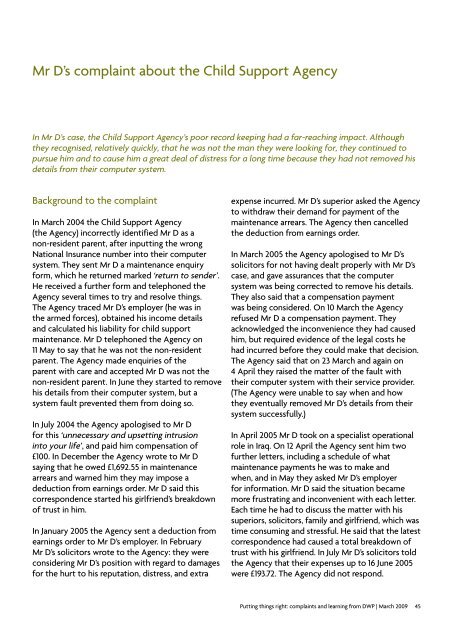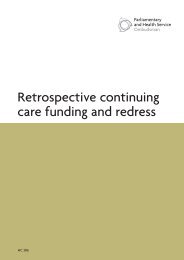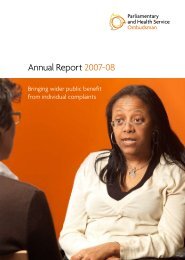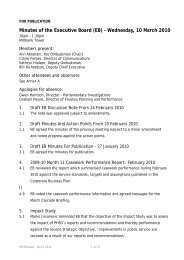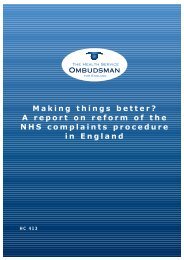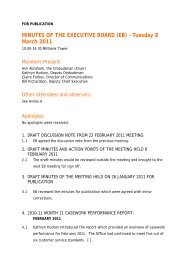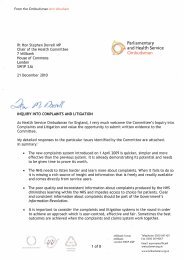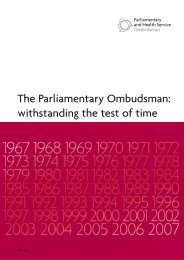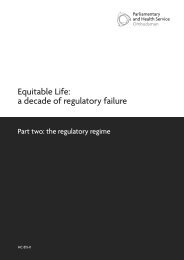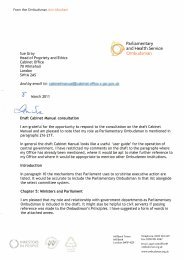Putting things right: complaints and learning from DWP - the ...
Putting things right: complaints and learning from DWP - the ...
Putting things right: complaints and learning from DWP - the ...
You also want an ePaper? Increase the reach of your titles
YUMPU automatically turns print PDFs into web optimized ePapers that Google loves.
Mr D’s complaint about <strong>the</strong> Child Support Agency<br />
In Mr D’s case, <strong>the</strong> Child Support Agency’s poor record keeping had a far-reaching impact. Although<br />
<strong>the</strong>y recognised, relatively quickly, that he was not <strong>the</strong> man <strong>the</strong>y were looking for, <strong>the</strong>y continued to<br />
pursue him <strong>and</strong> to cause him a great deal of distress for a long time because <strong>the</strong>y had not removed his<br />
details <strong>from</strong> <strong>the</strong>ir computer system.<br />
Background to <strong>the</strong> complaint<br />
In March 2004 <strong>the</strong> Child Support Agency<br />
(<strong>the</strong> Agency) incorrectly identified Mr D as a<br />
non‐resident parent, after inputting <strong>the</strong> wrong<br />
National Insurance number into <strong>the</strong>ir computer<br />
system. They sent Mr D a maintenance enquiry<br />
form, which he returned marked ‘return to sender’.<br />
He received a fur<strong>the</strong>r form <strong>and</strong> telephoned <strong>the</strong><br />
Agency several times to try <strong>and</strong> resolve <strong>things</strong>.<br />
The Agency traced Mr D’s employer (he was in<br />
<strong>the</strong> armed forces), obtained his income details<br />
<strong>and</strong> calculated his liability for child support<br />
maintenance. Mr D telephoned <strong>the</strong> Agency on<br />
11 May to say that he was not <strong>the</strong> non‐resident<br />
parent. The Agency made enquiries of <strong>the</strong><br />
parent with care <strong>and</strong> accepted Mr D was not <strong>the</strong><br />
non‐resident parent. In June <strong>the</strong>y started to remove<br />
his details <strong>from</strong> <strong>the</strong>ir computer system, but a<br />
system fault prevented <strong>the</strong>m <strong>from</strong> doing so.<br />
In July 2004 <strong>the</strong> Agency apologised to Mr D<br />
for this ‘unnecessary <strong>and</strong> upsetting intrusion<br />
into your life’, <strong>and</strong> paid him compensation of<br />
£100. In December <strong>the</strong> Agency wrote to Mr D<br />
saying that he owed £1,692.55 in maintenance<br />
arrears <strong>and</strong> warned him <strong>the</strong>y may impose a<br />
deduction <strong>from</strong> earnings order. Mr D said this<br />
correspondence started his girlfriend’s breakdown<br />
of trust in him.<br />
In January 2005 <strong>the</strong> Agency sent a deduction <strong>from</strong><br />
earnings order to Mr D’s employer. In February<br />
Mr D’s solicitors wrote to <strong>the</strong> Agency: <strong>the</strong>y were<br />
considering Mr D’s position with regard to damages<br />
for <strong>the</strong> hurt to his reputation, distress, <strong>and</strong> extra<br />
expense incurred. Mr D’s superior asked <strong>the</strong> Agency<br />
to withdraw <strong>the</strong>ir dem<strong>and</strong> for payment of <strong>the</strong><br />
maintenance arrears. The Agency <strong>the</strong>n cancelled<br />
<strong>the</strong> deduction <strong>from</strong> earnings order.<br />
In March 2005 <strong>the</strong> Agency apologised to Mr D’s<br />
solicitors for not having dealt properly with Mr D’s<br />
case, <strong>and</strong> gave assurances that <strong>the</strong> computer<br />
system was being corrected to remove his details.<br />
They also said that a compensation payment<br />
was being considered. On 10 March <strong>the</strong> Agency<br />
refused Mr D a compensation payment. They<br />
acknowledged <strong>the</strong> inconvenience <strong>the</strong>y had caused<br />
him, but required evidence of <strong>the</strong> legal costs he<br />
had incurred before <strong>the</strong>y could make that decision.<br />
The Agency said that on 23 March <strong>and</strong> again on<br />
4 April <strong>the</strong>y raised <strong>the</strong> matter of <strong>the</strong> fault with<br />
<strong>the</strong>ir computer system with <strong>the</strong>ir service provider.<br />
(The Agency were unable to say when <strong>and</strong> how<br />
<strong>the</strong>y eventually removed Mr D’s details <strong>from</strong> <strong>the</strong>ir<br />
system successfully.)<br />
In April 2005 Mr D took on a specialist operational<br />
role in Iraq. On 12 April <strong>the</strong> Agency sent him two<br />
fur<strong>the</strong>r letters, including a schedule of what<br />
maintenance payments he was to make <strong>and</strong><br />
when, <strong>and</strong> in May <strong>the</strong>y asked Mr D’s employer<br />
for information. Mr D said <strong>the</strong> situation became<br />
more frustrating <strong>and</strong> inconvenient with each letter.<br />
Each time he had to discuss <strong>the</strong> matter with his<br />
superiors, solicitors, family <strong>and</strong> girlfriend, which was<br />
time consuming <strong>and</strong> stressful. He said that <strong>the</strong> latest<br />
correspondence had caused a total breakdown of<br />
trust with his girlfriend. In July Mr D’s solicitors told<br />
<strong>the</strong> Agency that <strong>the</strong>ir expenses up to 16 June 2005<br />
were £193.72. The Agency did not respond.<br />
<strong>Putting</strong> <strong>things</strong> <strong>right</strong>: <strong>complaints</strong> <strong>and</strong> <strong>learning</strong> <strong>from</strong> <strong>DWP</strong> | March 2009 45


